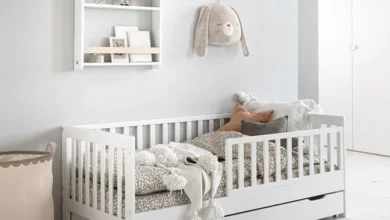How Cosleeping Can Help You and Your Baby

For the first year of life, or at least the first six months, it is safer for your infant to share a room with you, sleeping in a cot next to your bed. When parents bring their newborns into bed with them to sleep, this is known as co-sleeping. Some parents, for example, believe that co-sleeping with their newborns makes them feel comfortable and secure.
There are many methods for safe transitioning from co-sleeping. They enjoy the close bodily contact, find it pleasant and satisfying, and believe it is beneficial to their parent-child relationships. Some parents also co-sleep with their children since it is more convenient for them.
What are the benefits of co-sleeping?
Sleep more peacefully
In comparison to solo sleepers, who startle frequently throughout the night and spend four times the amount of time crying, research suggests that co-sleeping has a benefit in that newborns rarely startle during sleep and rarely cry during the night.
Stable physiology
Infants who sleep near their parents have more stable temperatures, regular heartbeats, and fewer long pauses in breathing than babies who sleep alone, according to studies. This means that babies sleep in a biologically safer environment.
Decreases risk of sudden infant death syndrome
SIDS rates are lowest (and even non-existent) in cultures where co-sleeping is the norm rather than the exception. SIDS is four times less likely in babies who sleep in or close to their parent’s beds. Co-sleeping newborns spend more time resting on their backs or sides, lowering their risk of SIDS.
Emotional well-being across time
Co-sleeping babies have stronger self-esteem, less anxiety, are more confident at a younger age, are better behaved at school, and are more at ease with affection. They also suffer from fewer mental issues.
Sleeping on an adult bed is safer than sleeping in a crib
Data on infant deaths in adult beds was published by the Consumer Product Safety Commission. However, compared to adult bed accidents, there were more than three times as many crib-related infant fatalities. Another recent large study found that bed-sharing did not raise the incidence of SIDS unless the mother smoked or drank excessively.
Sleep Safety Precautions
It’s vital to remember that sleeping arrangements are a personal choice, and there are many possibilities to consider. Co-sleeping isn’t right for every family, and the numerous ways to do it can work differently for different families. When it comes to co-sleeping, it’s critical to observe certain sleep safety guidelines, including putting the baby to sleep on their back and removing any loose or soft things from the sleeping area.
Follow the steps when you share the bed with your babies:-
- Alcohol and medications, especially prescriptions that alter sleep, should not be consumed by parents.
- If one or both parents suffer from sleep difficulties, they should not share a bed.
- Parents should not smoke in their children’s rooms or beds.
- Co-sleeping in a waterbed or on a very soft mattress is not recommended.
- Use a queen or king-sized mattress if possible.
- If they are heavy, they should not share sleeping space with their newborns because this increases the danger of turning over on the baby.
Wrapping up!
For all babies aged 0–12 months, room sharing, but not co-sleeping in the same bed, is the safest sleeping arrangement. The advantages of sharing a bed with your child do not outweigh the dangers.
If you consciously or unintentionally co-sleep with your infant on the same surface, make sure to avoid potentially dangerous situations and adhere to the instructions.




